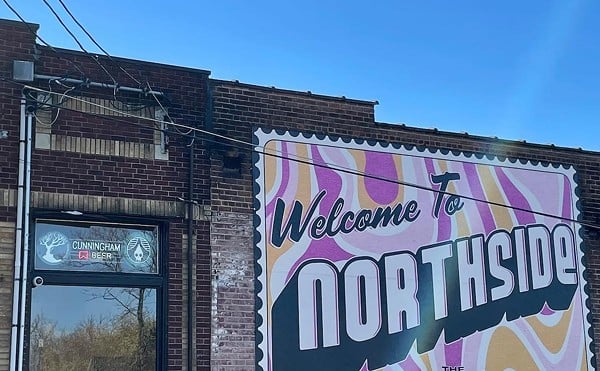|
Jerry Douglas has been at the forefront of the Bluegrass boom, but when the world's foremost resonator guitarist brings his band to Miami University-Hamilton's Parrish Auditorium on Nov. 2, don't expect the Soggy Bottom Boys, or even Alison Krauss & Union Station (AKUS), the band he's been a member of for the past four years.
"I think of O Brother and the Down from the Mountain tour as step one," the Warren, Ohio, native says. "Those put that music out in front of that many people in a short amount of time. And I want them to know what else we can do, where that music can take you. Bluegrass is the most influential part of what I do, undoubtedly, and I can't stray too far from it. But when you grow up these days, there are a lot of other things to listen to. The guys that originally played Bluegrass music grew up listening to the popular music of the day — string bands, Jazz stuff, Blues, Ragtime — and that's what they had to work from. We've had a great infusion of Rock & Roll to add to that list, and Modern Jazz. I think it's another step in the evolution of musical tangents."
Douglas is comfortable enough with that artistic double vision to have collected awards this year from both the Americana Music Association (Instrumentalist of the Year) and the International Bluegrass Music Association (Dobro Player of the Year), and he's a nominee for the Country Music Association's Musician of the Year, too.
"The Country folks, they're kind of slow to change, and they sort of vote the same thing every year," he laughs. "So I'm not going to have my heart broken, but it would be sweet."
If it happens, it will have the sweetness of a fond farewell, because Douglas has, at least for a while, put an end to one of the most prolific session careers anyone's enjoyed in Nashville in the past dozen years. If you've heard a Country or a Bluegrass record during that time, the odds are pretty decent he was on it. Eventually, he says, it got to him — and just as it did, the offer to join Krauss's band came along.
"I started getting that feeling that I could have possibly played almost the identical thing," he recalls. "Maybe not a solo, but the hooks all started hazing together. And there was so much session work that I didn't really want to do, and I didn't feel good about doing that. So it felt great, to be able to go ahead and get on the road with them."
When he finally found the time to release his own album, Lookout For Hope (Sugar Hill), putting his own band together and hitting the road during AKUS's off-season seemed a matter of course. The group — guitarist Bryan Sutton, bassist David Spicher, drummer Larry Atamanuik and fiddler Gabe Witcher — shares his musical outlook and versatility. "These guys are steeped in Bluegrass tradition, especially Gabe and Bryan; they can quote you verbatim a solo from almost any Bluegrass tune. But they're also very influenced by outside sources, the same as I am. We do break down in the middle of the show and do some traditional stuff — it's a grounding kind of feeling, to know that we're connected in that way, and we want people to know that we can do it. But what we're mostly doing is playing my music."
As his comments about influences and inspirations suggest, that music encompasses considerably more than Bluegrass. Indeed, though there are hints of it to be found throughout Lookout For Hope, the genre's signature banjo is missing altogether. "I wanted to include it in this record, but I just never found a place," he says.
"I've always liked saxophone players. I've stolen a lot of things that I heard saxophone players do," Douglas acknowledges with a laugh.
The album opens with a stunning rendition of Duane Allman's "Little Martha" — just Douglas on two of his favorite axes with only Barry Bales' bass for accompaniment — and includes a couple of other covers (Bill Frisell's title track among them), but it's mostly Douglas' own compositions.
"For this record I really wanted to see what was in my head," Douglas says. "And doing all these sessions, playing for other people and taking on their baggage while you're playing, makes it a little tough to figure out who you really are. So I finally just took a week, and I just played all week long into a recorder, and emptied my head of all kinds of phrases and melodies that had been floating through my head for the last three or four years. That's a large part of how this record was written. I just kind of put a bunch of melodies together that were related, and tried to figure out how to make them work together.
"When I'm working on my records, I try to get a shape in mind. But you really don't know what they are. They're like babies. You create these things, then they crawl, then they walk and then they talk, that's the way I look at it."
Douglas doesn't expect these creations to wander too far away from their roots. He just doesn't want to get completely entangled in them.
"We know that there are going to be hard-driving, hillbilly Bluegrass bands forever, and that's a wonderful thing, and I want to play in them," he says with a smile. "But that's not the end of it. O Brother made this kind of music known to a lot of people, but it's going to keep going whether we have Down from the Mountain tours or not. Because everyone that heard it loved it. No one said, 'Oh, that sucks.' They took a chance and came out and listened to something that they were really hoping that they would like, and they did.
"What we're doing now is another link in the chain, another step on the musical ladder. Like I heard someone say at the Americana Music Association awards: 'It's for people who are looking for a little bit more.' And we think we're able to give them that."
JERRY DOUGLAS and his band perform Saturday at Miami University-Hamilton's Parrish Auditorium.





